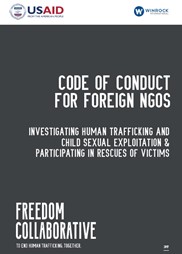This document was created as an accompanying document to our “NGO Involvement in Raid/Rescue Operations” Webinar, which was held in May 2017. The webinar examined the risks and benefits, how to conduct better operations, as well as provided options and successful alternatives. Our webinar panelists discussed if, and if so, in what circumstances NGOs can conduct raid and rescue operations. We also covered the importance of practices, standards, and principles organisations should hold themselves accountable.
The Code of Conduct is an attempt to set minimum standards for investigative NGOs operating in Southeast Asia. It seeks to set and uphold professional standards for the protection of victims of trafficking, NGO personnel, the integrity of the criminal justice process and the reputation of all parties in the sector.
We strongly encourage all investigative NGOs to review and adopt these standards and practices.

